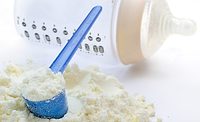Singapore to Allow New Ingredients in Infant Formula, in Alignment with U.S., EU

IMage credit: Rainier Ridao via Unsplash
The Singapore Food Agency (SFA) has proposed amendments to federal regulations that would allow the use of new ingredients in infant formula, and would also extend the use of permitted food ingredients.
Regarding infant formula, SFA proposes to make amendments to Regulation 252(6) to allow in infant formula:
- Sodium salt of 3'-sialyllactose: Up to 20 milligrams (mg) per 100 milliliters (ml) in the case of infant formula for an infant of or below 6 months of age, and up to 5 mg per 100 ml in the case of infant formula for an infant above the age of 6 months but not more than 12 months of age
- Sodium salt of 6'-sialyllactose: Up to 40 mg per 100 ml in the case of infant formula for an infant of or below 6 months of age, and 30 mg per 100 ml in the case of infant formula for an infant above the age of 6 months but not more than 12 months of age
- 3-fucosyllactose: Up to 44 mg per 100 ml
Sodium salts 3'-sialyllactose and 6'-sialyllactose, as well as 3-fucosyllactose, have been allowed for use in infant formula in the EU and the U.S. up to the proposed maximum levels. Based on positive evidence backing the safe uses of these additives, SFA has reviewed and approved the use of these new ingredients in infant formula.
SFA is also proposing to amend Regulation 252(6) increase the maximum levels of already permitted ingredients in infant formula. Specifically, SFA would increase the maximum level for 2’-fucosyllactose to 240 mg per 100 ml (from 20 mg per 100 ml). Additionally, for ingredient lactose-N-tetraose, SFA looks to increase the maximum level to 80 mg per 100 ml (previously 60 mg per 100 ml) for formulas meant for infants above the age of 6 months but not more than 12 months of age. The increased levels of these two ingredients re comparable to levels that naturally occur in human milk. The proposed levels are also permitted in Australia, New Zealand, the U.S., and the EU.
Other amendments to the Singapore food regulations proposed alongside the changes to maximum levels for infant formula ingredients include changes to the permitted forms of steviol glycosides. The amendments would replace the current forms of steviol glycosides listed in Regulation 18(1) with the four types of steviol glycosides produced by different methods, so as to align with Codex Alimentarius guidelines. There is no change with respect to food categories that may include steviol glycosides or maximum levels for food sold in Singapore. In its proposed amendments, SFA also aims to extend the use of permitted food additives L-theanine (to be allowed in salt substitutes at levels up to 15,000 parts per million [ppm]) and sucralose (to be allowed in soybean-based beverages up at to 400 ppm).
SFA is accepting public comments on the amendments until March 31, 2024.
Looking for a reprint of this article?
From high-res PDFs to custom plaques, order your copy today!






